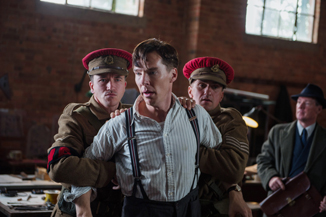Movie Review: The Imitation Game
By Matthew Huntley
January 5, 2015
The Imitation Game is about two fascinating subjects, either one of which could have made for a great movie. There are even moments when we believe the two will successfully merge together as a single, unified story. But as well made and performed as The Imitation Game often is, it doesn't quite reach its full potential of being both a character study and a historical thriller. When it dedicates time to one, the other loses steam, and so the collective narrative seems to be at odds with itself and misses out on finding a working balance.
The character the film studies is Alan Turing, the brilliant English mathematician whom many credit with designing the world's first digital brain, a.k.a. computer. Focused, aloof and incredibly intelligent, Alan, as the film paints him, was mostly an outsider who routinely upset his peers, probably because Alan was smarter than them and wasn’t afraid to show it. But what he lacked in social skills he made up with reasoning and determination, qualities that, we all know, don’t always gain you friends or admirers.
Alan’s cohorts constantly viewed him as a monster, and as bright and rational as he was, there were times when he saw himself in the same light. Alan respects himself as a mathematician but hardly likes himself as a man. Because he was a homosexual, there was always a cloud of shame looming over his head, which eventually led to his demise. The Imitation Game allows us to see that Alan was a difficult yet beautiful individual and a very troubled soul, and as much as the film tell us about him, it doesn’t tell us enough. It gives us snippets from his adolescence and we see how we was tortured by his classmates until he bonded with another young man with whom he eventually fell in love, but these scenes feel less like natural instances of character development and more like plot devices meant to tie in with the modern story.
The modern story is where the thriller aspect of The Imitation Game comes into play. It takes place in Manchester, England in 1951, when Alan (Benedict Cumberbatch) has just been robbed. Detective Nock (Rory Kinnear) enters the Cambridge Professor’s flat, which resembles a mad scientist's laboratory, and Alan warns the gumshoe not to breathe in too heavily because of the airborne chemicals. Then, with snide abrasion, he tells the detective to simply find the chap who broke in and promptly leave him alone. Nock feels insulted and gets the sneaking suspicion Alan is hiding something. Indeed he is, which leads to Alan’s arrest for indecency and his sitting in a murky, drab debriefing room in a police station, where he asks his interrogator to pay attention as he tells his full story.
In 1939, shortly after Britain officially confirmed she was at war with Nazi Germany, Alan applies for a secret government position at Bletchley Park under Commander Denniston (Charles Dance), who almost instantly dislikes him for his smug, irreverent attitude. Denniston is about to throw him out of his office until Alan reveals he knows about Enigma, the highly advanced encryption machine designed by the Germans to relay messages to its military. If the British can decrypt these messages, they believe they can win the war.
Continued:
1
2
|
|
|
|




